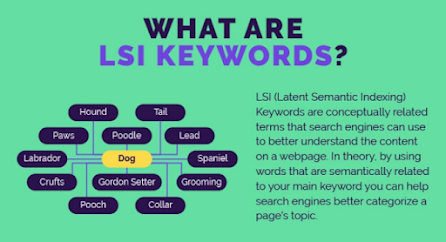Introduction: In the ever-evolving world of search engine
optimization (SEO), staying ahead of the curve is crucial to maintaining a
competitive edge. While incorporating relevant keywords has long been a
fundamental aspect of SEO, a more sophisticated approach involving Latent
Semantic Indexing (LSI) keywords can significantly boost the overall relevancy
of your content. In this blog post, we will explore what LSI keywords are, how
they work, and how to effectively use them to enhance your SEO strategy. To
illustrate their effectiveness, we will provide a practical example showcasing
the impact of LSI keywords.
Understanding LSI Keywords: LSI keywords, also known as
semantic keywords, are words or phrases that are closely related to the main
keyword of a webpage. Rather than relying solely on exact-match keywords,
search engines employ LSI to determine the context and relevance of a webpage's
content. By incorporating LSI keywords, you can signal to search engines that
your content provides comprehensive information about a specific topic, leading
to improved rankings and increased organic traffic.
How LSI Keywords Improve Relevancy:
- Enhancing
Contextual Understanding: LSI keywords help search engines better
understand the meaning and context of your content. By including
semantically related terms, you can provide a comprehensive overview of
your topic, increasing the relevancy of your page in the eyes of search
engines.
- Expanding
Keyword Variations: Incorporating LSI keywords allows you to expand the
range of keyword variations within your content. This helps you reach a
wider audience and attract visitors who might be using slightly different
search queries but are still interested in the same topic.
- Reducing
Keyword Stuffing: In the past, keyword stuffing was a common practice to
manipulate search engine rankings. However, search engines have improved their ability to recognise such strategies.
LSI keywords offer a more natural and organic way to include relevant
terms, mitigating the risks of keyword stuffing and maintaining a
high-quality user experience.
Example of LSI Keywords in Action: Suppose you have a
website about gardening, and your main keyword is "rose gardening."
Here's an example of how you can incorporate LSI keywords to improve the
relevancy of your content:
Original sentence: "Rose gardening requires proper care
and attention to ensure healthy growth. With LSI keywords: "Caring for
roses and providing adequate attention are essential for fostering healthy
growth in your rose garden."
In this example, the LSI keywords "caring for
roses" and "providing adequate attention" enhance the overall
context and relevancy of the sentence, providing search engines with a deeper
understanding of the topic.
Best Practices for Using LSI Keywords:
- Conduct
Thorough Keyword Research: Utilize keyword research tools to identify LSI
keywords related to your main keyword. Focus on terms that are
semantically linked and provide additional context to your content.
- Incorporate
LSI Keywords Naturally: While LSI keywords are essential, avoid overusing
them or forcing their inclusion. Maintain a natural flow of language to
ensure a positive user experience.
- Analyze
Competitor Content: Study the content of your competitors who are ranking
well for your target keywords. Identify the LSI keywords they are using
and find opportunities to incorporate them in your own content.
- Regularly
Update and Optimize: SEO is an ongoing process, and regularly updating
your content with fresh LSI keywords can help you maintain relevancy and
keep up with changing search trends.
Conclusion: Incorporating LSI keywords into your SEO
strategy is an effective way to improve the relevancy of your content in the
eyes of search engines. By providing a deeper understanding of your topic and
expanding keyword variations, you can attract more organic traffic and enhance
your website's visibility










